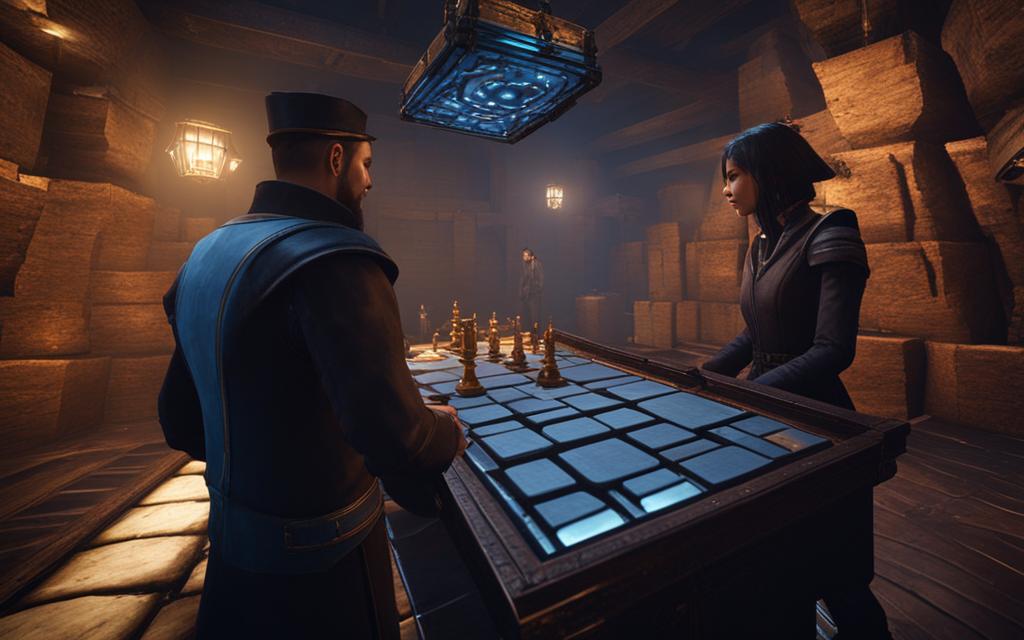The integration of artificial intelligence (AI) in game development has brought forth a new era of immersive and captivating experiences. AI-driven narrative games have revolutionized storytelling techniques and introduced dynamic gameplay that adapts to player choices and actions. In this article, I will delve into the transformative impact of AI on game development and explore how it has reshaped the narrative structures in the gaming industry.
Key Takeaways:
- AI-driven narrative games utilize advanced algorithms and machine learning techniques to dynamically adapt the story based on player choices and actions.
- AI algorithms analyze player behavior to create dynamic storylines that cater to individual preferences, resulting in a personalized and immersive gameplay experience.
- Emerging gaming technologies like procedural content generation and advanced algorithms enhance AI narratives, leading to infinite possibilities in game worlds and more realistic character behavior.
- AI’s integration in modern gameplay has reshaped consumer expectations and the overall dynamics of the gaming industry.
- AI-driven NPCs simulate human-like behavior and adapt to player actions, enabling more immersive and engaging player-NPC interactions.
Examining AI’s Role in Transforming Narrative Structures
AI has revolutionized the gaming industry by transforming narrative structures in games. With the integration of AI algorithms, storytelling has become adaptive, offering players a personalized and unique gameplay experience. By analyzing player choices and dynamically adjusting the story, AI creates narratives that are tailored to individual preferences.
The role of AI in storytelling goes beyond mere decision-making. It analyzes player behavior, learns from it, and adapts the narrative accordingly. This leads to immersive gameplay that evolves in response to the player’s actions, creating a dynamic and engaging experience.
AI in game narratives enables developers to break free from linear storytelling and embrace non-linear, branching paths. This opens up a multitude of possibilities and outcomes, allowing players to shape the story based on their decisions. With adaptive narratives powered by AI, every playthrough becomes a unique adventure.
Furthermore, AI enhances the depth and complexity of characters within game narratives. By simulating human-like behavior and responses, AI-driven characters add realism and immersion to the gaming experience. They can interact with players in dynamic ways, responding intelligently to their actions and choices.
“The integration of AI in game narratives has unlocked a new level of storytelling potential. It allows for personalized experiences and dynamic narratives that evolve with player choices, leading to more immersive and engaging gameplay.”
The transformative power of AI in reshaping narrative structures within the gaming industry cannot be understated. With AI in game narratives, developers can create adaptive and immersive experiences that captivate players and keep them coming back for more.
The Evolution of AI within the Gaming Ecosystem
This section delves into the fascinating journey of AI within the gaming ecosystem, highlighting its progression from basic pathfinding algorithms to the complex storytelling capabilities it possesses today. By exploring the advancements in AI technology, we gain valuable insights into its profound impact on game development and the gaming industry as a whole.
From Basic Pathfinding to Complex Storytelling
AI’s evolution within the gaming ecosystem began with its early applications in basic pathfinding algorithms. Initially, AI served the purpose of guiding non-playable characters (NPCs) through game environments, ensuring efficient navigation and interaction.
Over time, AI expanded its role and became a significant driving force behind compelling storytelling in games. With advanced algorithms and machine learning techniques, AI can analyze player choices and actions, allowing for dynamic and personalized narratives. This evolution has led to the creation of immersive game worlds where player decisions shape the outcome of the story.

A Chronological Glance at AI Advancements in Gaming
Let’s take a chronological journey to trace the remarkable advancements in AI within gaming.
- The birth of AI: In the early days of gaming, AI existed in rudimentary forms, with simple rules and algorithms guiding NPC behavior.
- Refining pathfinding: As games became more complex, developers focused on improving AI’s pathfinding capabilities. NPCs could navigate intricate game environments, overcoming obstacles and finding optimal routes.
- Breathing life into characters: With advancements in AI, NPCs began to exhibit more realistic behaviors. They could react to player actions and display emotions, enhancing the immersive experience.
- Adaptive AI: The next milestone was the introduction of adaptive AI, which enabled NPCs to adapt and learn from player behavior. This allowed for dynamic and personalized gameplay experiences.
- Machine learning revolution: Recent years have witnessed the integration of machine learning algorithms into game development. AI can now analyze massive amounts of data, providing more sophisticated interactions and storytelling capabilities.
These significant advancements highlight the transformative potential of AI within the gaming ecosystem. As technology continues to progress, we can expect AI to play an increasingly integral role in shaping the future of gaming.
Customizing Player Experience with Dynamic AI Storylines
AI-driven games have revolutionized the player experience by offering dynamic AI storylines that adapt to individual choices and actions. Through advanced AI algorithms, games analyze player behavior, creating personalized and immersive gameplay. This section explores the fascinating world of dynamic AI storylines and their impact on personalized gameplay and player experience.
The integration of AI technology in game development has paved the way for dynamic storytelling. With dynamic AI storylines, players are no longer passive observers but active participants in shaping the narrative.
This innovative approach to storytelling allows players to have a unique and tailored gameplay experience. The AI algorithms analyze player behavior, choices, and actions, and dynamically adjust the storyline in real-time. This means that each player’s journey is distinct, offering a level of personalization previously unseen in traditional linear narratives.
The use of dynamic AI storylines enables games to respond to the player’s decision-making, resulting in a truly interactive and engaging experience. As players navigate through the game world, their choices shape the outcome, leading to different branching paths and narrative possibilities.
Personalized Gameplay:
One of the key benefits of dynamic AI storylines is the ability to deliver personalized gameplay. With AI algorithms constantly adapting the storyline based on player behavior, each player feels like the protagonist of their own unique adventure.
Personalized gameplay enhances player immersion and engagement, as they become emotionally invested in the outcome of the story. This sense of ownership and agency over the narrative keeps players captivated and eager to discover the consequences of their choices.
Immersive Player Experience:
The combination of dynamic AI storylines and personalized gameplay creates a highly immersive player experience. Players feel deeply connected to the game world and its characters, as their actions directly influence the unfolding story.
The interactive nature of dynamic AI storylines fosters a sense of realism and authenticity, transporting players into a virtual world that feels alive and responsive. This immersion enhances the emotional impact of the narrative, making the overall gameplay experience more memorable and meaningful.
With dynamic AI storylines, games have evolved beyond static narratives, offering players a more dynamic and personalized experience. Whether it’s an epic adventure, a suspenseful thriller, or an emotional journey, dynamic AI storylines have the power to captivate players and create truly unforgettable gaming experiences.
Emerging Gaming Technologies and Their Influence on AI Narratives
In the world of gaming, emerging technologies are constantly pushing the boundaries of what is possible. These advancements have a significant impact on the development of AI narratives, bringing new levels of immersion and excitement to gamers. In this section, we will explore two key areas where emerging technologies are revolutionizing AI narratives: procedural content generation and advanced algorithms for character behavior.
Procedural Content Generation and Infinite Possibilities
Procedural content generation (PCG) is a groundbreaking technology that allows games to generate content dynamically, creating unique and ever-changing game worlds. The use of PCG in AI narratives provides game developers with infinite possibilities for creating immersive and engaging experiences. By utilizing algorithms to generate environments, landscapes, and storylines in real-time, games can offer players a sense of exploration and discovery like never before.
Through PCG, AI narratives can constantly evolve, adapting to the player’s actions and choices. This dynamic nature of storytelling ensures that each player’s experience is unique, fostering a deeper level of player engagement and replayability. As AI algorithms analyze player behavior and preferences, PCG can intelligently generate content that matches the player’s playstyle, creating a more personalized and tailored gaming experience.

Enhanced Character Behavior through Advanced Algorithms
Advanced algorithms play a vital role in enhancing the behavior of in-game characters, making them more realistic and responsive. Traditional NPC (non-playable character) interactions often felt scripted and predictable, but with advanced algorithms, AI-driven characters can exhibit complex behaviors and adapt to player actions.
By incorporating advanced algorithms, AI narratives can create characters that learn and evolve throughout the game. These characters can respond to players’ choices and adapt their behavior accordingly, creating a truly immersive and interactive gameplay experience. Whether it’s a companion NPC that develops a relationship with the player or an enemy NPC that adjusts its strategy based on the player’s skills, advanced algorithms enable characters to feel more lifelike and believable.
The use of these emerging gaming technologies, such as procedural content generation and advanced algorithms for character behavior, is transforming the landscape of AI narratives in gaming. These technologies provide developers with the tools to create rich, dynamic, and personalized experiences for players. As the gaming industry continues to evolve, we can expect AI narratives to become even more powerful and captivating, pushing the boundaries of storytelling and immersion in gaming.
Gaming Industry Trends: AI’s Integration in Modern Gameplay
In today’s gaming industry, the integration of artificial intelligence (AI) in modern gameplay has become an increasingly prevalent trend. AI technologies are revolutionizing the way games are developed, played, and experienced. In this section, we will explore the current trends in the gaming industry regarding the incorporation of AI, highlighting its impact on consumer expectations and the overall dynamics of gaming.
Statistics that Show Growing AI Incorporation
Statistics demonstrate the growing adoption of AI in the gaming industry. According to recent research, 63% of game developers are incorporating AI algorithms into game design and development processes. This rise in AI incorporation is driven by the desire to enhance gameplay experiences, create dynamic narratives, and provide personalized content tailored to individual players’ preferences.
Furthermore, the global gaming AI market is projected to reach $10.9 billion by 2027, indicating the increasing investment in AI technologies within the gaming industry. This substantial market growth reflects the industry’s recognition of AI’s potential to revolutionize gaming experiences and meet evolving consumer expectations.
How AI Reshapes Consumer Expectations and Gaming Dynamics
The integration of AI in modern gameplay has had a profound impact on consumer expectations and the dynamics of gaming. AI-powered games offer players immersive and dynamic experiences that adapt to their choices, creating more engaging gameplay. Players now expect games to provide personalized content, adaptive narratives, and intelligent non-playable characters (NPCs) that simulate human-like behavior.
AI-driven advancements have also reshaped the competitive landscape of the gaming industry. Esports, a rapidly growing segment of the gaming industry, heavily rely on AI technologies for data analysis, performance tracking, and creating realistic virtual opponents. AI-enabled matchmaking algorithms ensure fair competition and create challenging gameplay experiences.
Moreover, AI’s integration in gaming has opened up new possibilities for cross-platform experiences and collaborative gameplay. AI algorithms enable seamless integration between different gaming platforms, fostering a diverse and interconnected gaming community.
| Gaming Industry Trends | AI Incorporation | Consumer Expectations | Gaming Dynamics |
|---|---|---|---|
| Increase in AI adoption | 63% | Rise in demand for personalized content | Dynamic and immersive gameplay experiences |
| Projected market growth | $10.9 billion by 2027 | Expectation of adaptive narratives | Competitive esports ecosystem |
| Advancements in AI-driven gaming | Enhanced gameplay experiences | Simulated human-like behavior in NPCs | Cross-platform integration |
The New Frontier of Player-NPC Interaction Encouraged by AI
AI has unlocked a new frontier in player-NPC interaction, enabling more immersive and engaging gameplay experiences. With the advancement of AI-driven NPCs, virtual worlds have become more dynamic and realistic, offering players an unprecedented level of interaction.
AI-driven NPCs simulate human-like behavior, adapting to player actions and creating realistic and dynamic interactions. These non-player characters are no longer static entities but intelligent beings that respond to the player’s choices and actions, providing a personalized gameplay experience.
The seamless integration of AI in player-NPC interaction has revolutionized the way players engage with virtual worlds. It brings the game’s narrative to life, allowing players to forge meaningful connections with AI characters. This level of immersion enhances the overall gameplay experience, making it more captivating and memorable.

AI-driven NPCs have the ability to analyze player behavior, adapt their responses, and dynamically shape the game’s storyline. This adaptability creates a sense of agency for players, as their decisions have real consequences within the game world. It adds depth and complexity to the gameplay, keeping players engaged and invested.
By examining the impact of AI on player-NPC interaction, we can understand the transformative potential of AI in shaping the future of gaming. The integration of AI technology has paved the way for more immersive and interactive gameplay experiences, further blurring the line between the virtual and real worlds.
The future holds exciting possibilities for player-NPC interaction, as AI continues to advance and evolve. As AI-driven NPCs become more sophisticated and intelligent, players can expect even more realistic and compelling interactions in gaming. This ongoing innovation in AI-driven gameplay promises to deliver unprecedented levels of immersion and engagement for players around the world.
The Ethics of AI in Gaming: Creativity vs. Automation
The integration of AI in gaming has sparked important ethical discussions surrounding the delicate balance between creativity and automation in game development. As AI-driven technologies continue to advance, there is an ongoing debate regarding the role of AI assistance versus human ingenuity and the potential impact on game development roles.
Balancing the Scales: AI Assistance vs. Human Ingenuity
AI assistance in game development offers valuable support and efficiency. AI algorithms can analyze vast amounts of data, providing insights and suggestions to enhance gameplay, level design, and overall user experience. Automation can streamline repetitive tasks, allowing developers to focus on more creative aspects of game design.
However, concerns arise when AI assistance begins to overshadow human creativity. The fear of an overreliance on AI diminishes the unique contributions and perspectives that human developers bring to the gaming industry. Striking the right balance between utilizing AI’s capabilities and preserving human creativity is crucial to ensure the continued innovation and artistic expression in game development.
Debates Around AI’s Impact on Game Development Roles
The integration of AI in gaming has raised questions about the future of game development roles. Some argue that AI may replace certain roles, leading to potential job displacement and the need for upskilling. However, others believe that AI will augment rather than replace game development roles, allowing developers to focus on more complex and creative tasks.
Additionally, concerns surrounding AI bias and ethical considerations have further amplified the debates. Ensuring that AI-generated content aligns with ethical standards and diversity principles is crucial for promoting inclusivity and avoiding harmful stereotypes in the gaming industry.
Ultimately, the impact of AI on game development roles necessitates careful consideration and ongoing dialogue. By embracing AI as a valuable tool while preserving the essential role of human ingenuity, the gaming industry can navigate the ethical challenges and achieve a harmonious integration of AI technologies.
| Pros of AI Assistance | Cons of AI Assistance |
|---|---|
| Efficient data analysis | Potential overreliance on AI |
| Streamlined repetitive tasks | Diminished human creativity |
| Enhanced insights for gameplay | Potential job displacement |
| Automation of certain processes | Ethical considerations and bias |
Global Gaming Industry Trends Leading to AI-Driven Futures
As the gaming industry continues to evolve, it is crucial to analyze the emerging trends that are shaping its future. One of the most significant trends in recent years is the integration of AI-driven technologies in gameplay. By conducting a comprehensive market analysis, we can gain valuable insights into the rise of AI integration and its potential impact on the gaming industry.
Market Analysis Predicting the Rise of AI Integration
Market analysis plays a pivotal role in understanding the direction the gaming industry is headed. It involves examining current trends, consumer behavior, and technological advancements to make informed predictions about the future. In the case of AI integration, market analysis indicates a clear upward trajectory. The demand for AI-driven gameplay experiences has been steadily growing, with players craving more immersive and dynamic narratives. Game developers and publishers are recognizing this demand and investing in AI technologies to deliver captivating gaming experiences.
Furthermore, market analysis reveals substantial investments in AI-driven gaming startups and ventures. Venture capitalists and industry giants have identified the potential of AI-driven narratives, leading to a surge in investments in companies specializing in AI-powered game development. This influx of capital showcases the confidence placed in AI’s ability to revolutionize the gaming industry and shape its future.
Identifying Patterns in Player Engagement and AI Adaptation
Understanding player engagement and AI adaptation is crucial to unlocking the full potential of AI-driven futures in gaming. By identifying patterns in player behavior and preferences, developers can tailor their AI systems to enhance player experiences. AI technology analyzes player engagement data, such as in-game choices, playtime, and feedback, to create dynamic and personalized gameplay. This analysis not only improves the immersive qualities of games but also enhances player satisfaction and retention.
Additionally, AI adaptation involves the continuous evolution and improvement of AI algorithms to keep up with player expectations and advancements in technology. By analyzing player engagement data, developers can identify areas for improvement and implement AI adaptations that enhance gameplay experiences. This iterative process fuels the development of more sophisticated AI systems and sets the stage for ever-evolving AI-driven futures in gaming.

| Trends | Impact on Gaming Industry |
|---|---|
| AI-Driven Personalization | Enhances player experiences through dynamic storytelling and personalized gameplay. |
| Virtual Reality | Integrates AI algorithms to create immersive VR experiences that transport players to new worlds. |
| Multiplayer AI | Enables realistic interactions between players and AI-driven non-playable characters, enhancing social gameplay experiences. |
| Procedural Content Generation | Creates vast and procedurally generated game worlds, increasing replayability and player engagement. |
Conclusion
Throughout this article, we have explored the transformative power of AI in the gaming industry, specifically in the development of AI-driven narrative games. By harnessing advanced algorithms and machine learning techniques, these games have revolutionized the way stories are told and experienced by players.
AI-driven narrative games offer dynamic gameplay experiences that adapt to player choices and actions, creating personalized storylines that cater to individual preferences. This customization enhances player immersion and engagement, making AI-driven narratives a significant trend in the gaming industry.
Looking ahead, the future of AI-driven narrative games in the gaming industry appears promising. As AI continues to evolve, we can expect even more sophisticated storytelling techniques and innovative gameplay experiences. AI-driven NPCs that simulate human-like behavior and interactions will further enhance player engagement, blurring the lines between virtual and real-world experiences.
In conclusion, AI-driven narrative games are reshaping the gaming industry, pushing the boundaries of creativity and automation. As technology advances, the future holds immense potential for AI to further enhance gameplay experiences, making the future of gaming truly exciting and immersive.
